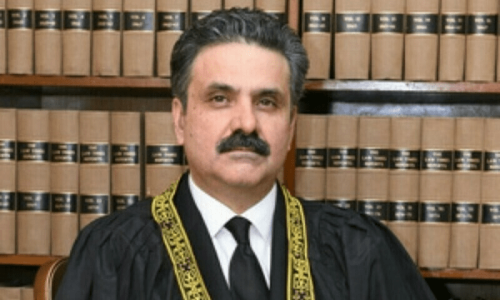IN the shadowy realm of addiction, crystal methamphetamine casts a dark and insidious grip, trapping the youth in its unforgiving grasp. Within the confines of Al-Khidmat Rehabilitation Centre, amidst the hushed whispers of healing and hope, the stories of Ashfaq, Shah Jehan, and the dedicated professionals guiding them towards recovery unfold with raw honesty and profound resilience.
In Pakistan, the staggering toll of drug-related complications and overdoses claim approximately 700 lives daily, amounting to a heart-wrenching total of 250,000 deaths annually, according to ‘International journal of surgery: global health’.
An estimated seven million people across the nation are reported to be habitual drug addicts, the journal reported, but law enforcers are increasingly concerned over the growing prevalence of drug abuse in Khyber Pakhtunkhwa, particularly among students.
Ashfaq, once a promising IT supervisor, found himself addicted to crystal methamphetamine in 2014. What started off as an occasional user but it quickly turned into a destructive habit that crushed his dreams and shattered his relationships. “It was like sinking into quicksand,” he recalls. “Every attempt to break free only pulled me deeper.”
Across the room, Shah Jehan’s story resonates with a quieter intensity. His weekend get-together with crystal meth provided a brief escape from the stresses of life, shrouded in secrecy to shield his loved ones from the pain. “I thought I could keep it hidden,” he confesses.
In the heart of this crucible of transformation stands Aqeela Ibrahim, a beacon of compassion and expertise in the field of addiction psychology. “Every story is unique,” she feels. “But beneath the surface, the pain is universal.”
Dr Ajmal Shah, a seasoned psychiatrist at the rehabilitation centre, sheds light on the severe effects of addiction to crystal meth. Physically, the toll is shown by scarred bodies and exhausted souls of those caught in its grasp. “It’s a battle waged on multiple fronts,” he observes. “But with perseverance and support, victory is within reach.”
As Ashfaq and Shah Jehan go through the rehabilitation and detoxification process, their journeys are marked by moments of success and suffering. “It’s not easy,” Ashfaq admits. “But every step forward is a victory in itself.”
Within the tranquil sanctuary of the centre, amidst the echoes of healing and hope, a silent revolution unfolds. Through the courage of individuals like Ashfaq and Shah Jehan, and the unwavering dedication of professionals like Aqeela Ibrahim and Dr Ajmal Shah, the shadows of addiction are gradually dispelled, replaced by the promise of a brighter tomorrow.
Acknowledging the broader scope of the battle against addiction, Capital City Police Officer Ashfaq Anwar offers a sobering reflection: “Our efforts to combat drug abuse are ongoing, but we cannot prevail alone. It requires a unified effort from the society, healthcare professionals, and law enforcement (agencies) to stem the tide of addiction and provide aid to those in need.”
Mr Anwar has drawn attention to a critical loophole in the regulation of chemical supplies essential for medicine production, revealing that drug manufacturers currently enjoy unrestricted access to these vital chemicals, which serve as primary ingredients in the production of crystal meth.
Expressing deep concern, the city police chief underscores the urgent need for a robust legal framework and strict monitoring protocols to regulate the flow of drugs and associated materials within the market.
He particularly stresses the importance of distinguishing between synthetic and organic drugs, highlighting the risks posed by synthetic variants. Furthermore, Mr Anwar advocates measures to tackle the issue of offenders who frequently evade the consequences through legal manoeuvres.
These insights from law enforcement illuminate the multifaceted nature of combating addiction, extending beyond traditional approaches to encompass policy and regulation. By addressing systemic issues and implementing comprehensive strategies, communities can work towards a future where the grip of addiction loosens, and the promise of recovery shines even brighter.
Published in Dawn, May 26th, 2024











































Dear visitor, the comments section is undergoing an overhaul and will return soon.